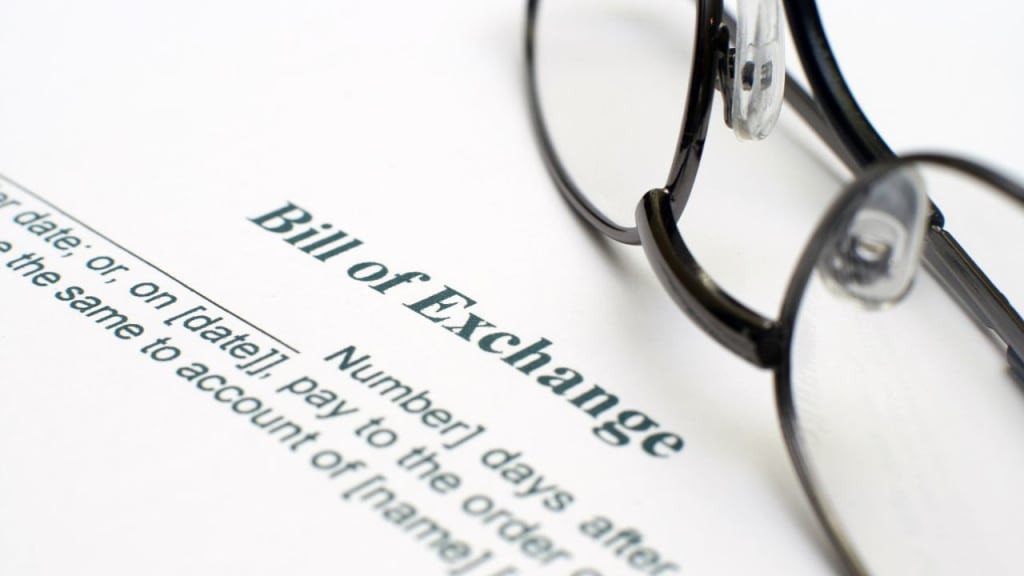Significance of Bills of Exchange in Global Trade
Explore the major role of Bills of Exchange in driving efficiency and security in global trade transactions. Dive into the significance of this financial instrument as we explore its impact on international commerce, risk mitigation, and payment facilitation.

In today's business world, people usually buy things on credit instead of using cash. This means the buyer promises to pay the seller later. To make this promise official, they use something called a bill of exchange.
This document is super important for both local and global trade. It's like a written agreement that helps everyone involved understand how things work in the business world. Let's break down how a bill of exchange works and why it matters!
What is a Bill of Exchange?
A bill of exchange is a written order used primarily in international transactions that obligates one party to pay another party a specified amount of money on demand or on a specified date. Instruments of exchange such as checks and promissory notes — can be downloaded by individuals or banks, and can usually be transferred by endorsement.
How does a Bill of Exchange work?
A bill of exchange deal can include three main parties:
Drawer
Drawee
Payee
The drawee is the one who pays the specified amount, the payee receives that amount, and the drawer is the party making the drawee pay the payee. Usually, the drawer and the payee are the same, unless the drawer transfers the bill to a third party.
Unlike a check, a bill of exchange is a written document showing a debtor's debt to a creditor. It's often used in global trade to pay for goods or services. Although not a contract itself, it helps fulfil contract terms. Payments can be due immediately or at a later date, with credit terms like 90 days. The drawee must accept it for it to be valid.
Bills of exchange don't usually pay interest, but they may if not paid by a specified date. They can also be transferred at a discount before the payment date. The bill must clearly state the amount, date, and parties involved, including the drawer and drawee.
If a bank issues it, it's called a bank draft, ensuring payment. When individuals issue it, they're called trade drafts. If payment is immediate, it's a sight draft; if in the future, it's a time draft. Sight drafts let exporters hold goods until importers pay and take delivery.
Bills of exchange are handy in global trade, helping manage risks from currency changes and legal differences. Unlike a promissory note, a bill of exchange is transferable and can bind a party to pay someone not involved in its creation.
Banknotes are typical promissory notes, while a bill of exchange is issued by the creditor, instructing the debtor to pay within a specific time. On the other hand, a promissory note is issued by the debtor, promising to pay a particular amount in a given time.
Bills of Exchange in International Trade
International trade transactions can get pretty complex with various currencies, different parties, and legal regulations across time zones. That's where a bill of exchange comes in handy.
Basically, the seller writes a bill to the buyer, and a bank can step in to guarantee the payment as a third party. Now, if the buyer doesn't honour the bill and misses the payment deadline, the bank (the payee) is responsible for making sure the seller still gets paid.
Advantages of Bill of Exchange in Global Trade
- Legal Proof: A bill of exchange used in exports acts as a strong legal document, providing evidence of the debt. If there's a dispute or non-payment, the person who issued the bill can use it as proof to take legal action and get the owed amount.
- Clear Amount and Date: The bill clearly states the amount and due date, making it transparent and certain for both parties. This avoids any confusion about payment and helps with proper financial planning.
- Discounting Option: A great advantage of a bill of exchange is the option to get immediate funds before the due date. The bill can be sold to a bank or financial institution at a discounted rate, enabling early cash realisation and improving cash flow.
- Transferability: Bills of exchange, especially those payable to the bearer, can be transferred from one person to another. This flexibility helps settle debts or facilitate trade transactions, enhancing their liquidity.
- Full Credit Period for Payer: The person who has to make the payment on the due date gets the benefit of the full credit period granted by the bill of exchange. They aren't required to pay before the specified date, allowing them to manage their cash flow effectively and use the funds until the bill matures.
Bill of exchange also assists business owners in exporting and importing goods. EPCG Scheme also enables the exporters to import capital goods at a discounted rate.
Disadvantages of Bill of Exchange
- Not ideal for the long run: Bills of exchange are mainly used for short-term deals and aren't the best choice for long-term money arrangements.
- Watch out for the due date: The person who needs to pay the bill has to make sure they pay on time, and that can put a strain on their wallet and financial plans.
- Not great for banking stuff: Bills of exchange don't work well with many banking services. They're a bit complicated and not as flexible as other money tools.
- Extra costs with bill discounts: If you get a discount on a bill of exchange, it might end up costing you extra money, making things financially tougher.
Conclusion
The significance of Bills of Exchange in global trade is undeniable. These financial instruments play a crucial role in facilitating smooth and efficient transactions across borders.
By providing a secure mechanism for payment and promoting trust between parties, bills of exchange contribute to the growth and expansion of international trade. Their flexibility and adaptability make them valuable tools for businesses engaging in diverse transactions, from short-term deals to complex trade agreements.
Despite their limitations in long-term financial arrangements and certain banking services, the enduring relevance of bills of exchange underscores their continued importance in the ever-evolving landscape of global commerce.
As businesses continue to navigate the complexities of international trade, understanding and leveraging the significance of bills of exchange remains a key factor in fostering economic collaboration and prosperity on a global scale.
About the Creator
Human Resource India
Hire The Right Candidates - Optimize your Workforce & Grow Your Business.






Comments
There are no comments for this story
Be the first to respond and start the conversation.